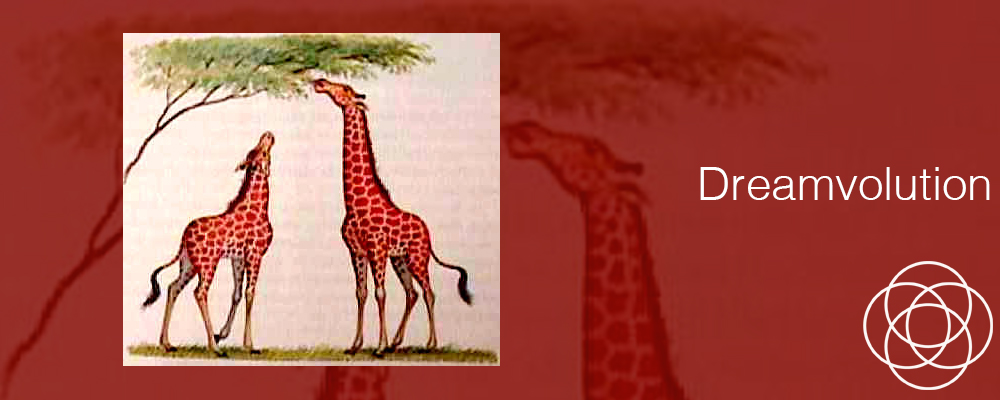When life presents you with change, how do you usually respond? Do you resist, hanging on to the way you have always done things, sticking to the routines and habits that have always worked for you? Or do you jump right in, eager for something new, tossing the old way aside without so much as a fond farewell?
When was the last time you were faced with an unexpected major change? What was it: a relationship break-up, an illness, a financial loss, a windfall, pregnancy, a restructuring at work, a job loss, falling in love, or being given a new responsibility?
Do you remember any stand out dreams you had back then? How many of those dreams involved animals?
Dreams can be at their most surreal and vivid during times of change. Each night as you sleep, your dreaming mind juggles the puzzle pieces of your changing life, mixing and matching bits from the old picture (your old way of seeing life) with bits of the new, searching for a workable Big Picture that suits your new conditions.
Between leaving the comfort zone of the old Big Picture and feeling at home in the new Big Picture is scary territory, as you face the challenges, fears and adventure of the unknown. Your stress levels shoot up and you live on edge, buoyed up by boosts of adrenalin preparing you for ‘fight or flight’, to battle through the threats to your survival or to run away, save your skin, and hide.
Yes, times of change bring your basic survival instincts to the fore. Life gets down to the fundamentally important issues such as food, money, shelter, love, life, and death. Thanks to nature, your instincts take over – or, at least, they try to be heard – especially in your dreams.
As complex human beings we have ways of drowning out our instincts, burying our heads in the sand(*), hoping the challenges of change will go away if we pretend they’re not there. But how long can this last? Deep down the adrenalin still floods our bodies, wearing us away with deeply festering, unacknowledged stress.
* (Even the ostrich, being an animal in tune with its survival instincts, is not silly enough to deny the obvious. It’s a myth that ostriches bury their heads in the sand when they’re scared. In fact they lay their light coloured heads on the ground, blending with it. It’s a camouflage trick.)
But at night, with your conscious defences down, your dreams reveal your basic survival instincts, often in the shape of animals, frequently magical, vivid, or surreal animals, mixed with more obvious themes of survival such as death and birth. Your dream animals, at these times, often seem magical or awesome because they seem to offer you the chance of awesome transformation, fantastic adaptation to change.
How can you listen to and learn from your dream animals? Firstly remember that everything in your dreams – wondrous animals, death, and destruction included – is a symbol of your own beliefs, energies, and feelings. At times of change, your dreaming mind often pictures your survival instincts as animals; it pictures your wondrous potential for change and adaptation as awesome animal auras; it pictures the end of the old way of life as death, and it pictures the new potential coming into your life as birth.
If you dream of a lion, for example, ask “What is the energy of a lion?” Different people will answer in different ways. It’s YOUR feeling for the energy of a lion that matters, as this is YOUR dream. For example, you might say, “Quiet strength”. Another person might say “Confidence”. Another might say, “Vicious predator”. Then ask yourself why this survival instinct might be trying to be heard at this time in your life. Let your answers flow. As with all dream work, this is all about awareness. When you are aware of the various energies within you at any one particular time, you are better informed to make decisions – in this case, to choose the best way to adapt to the challenge of change.
During times of change, it’s common to have a succession of animal dreams as a number of different survival instincts are stirred into action as you grapple with change. Here’s a powerful dream alchemy practice you can do that will really move things forward for you, by bringing you into a deeper awareness of the survival instincts being summoned up within you:
During the period of change, write a list of all the animals that appear in your dreams. Then imagine these animals sitting in a circle, discussing the best way to survive. (You can either do this in your mind’s eye, or, perhaps more powerfully, let your pen or keyboard type the conversation as fast as you let it flow.) As an example, you might end up with something like this:
Lion: “Quiet confidence wears away your enemies and conserves your energy – don’t waste so much time wondering if you’re good enough! Embrace the change!”
Sheep: “Stick with the crowd. Don’t try to lead. You’ll only end up with more responsibilities.”
Bird: “Come up here and see the view from above. Sometimes a change of perspective helps. Get a bit more distance from this!”
Worm: “You don’t often see me, I know, because I like to bury deep and hide, but I must say, I quite like the sunshine out here. Oh no! I’m drying up, burning, help! I’m dying!”
Bird: “Ah, worm! Yum! You see, from my perspective this little worm’s been doing you no good burrowing away inside, eating you up from the inside out. Death to old worms! Long live the power of perspective!”
Kangaroo: “Anyone tried this? (Jump, spring, leap.) I found this new way of getting around. Think it will catch on? Hey! You should see this cool new way I’ve found to carry the babies around too. Think there’s a market in this?”
By getting your dream animals to interact in conversation, you invite new perspectives, healing, integration – in short, personal evolution.
In this example, the dream animals express their individual survival instincts and, from this sharing, a new picture of your inner world emerges. You become aware of the conflicts (for example, whether to lead or follow) and you discover why (for example, issues of responsibility and being good enough). In this example you identify the worm (the stress deep down inside) and you put an end to it (by getting clearer perspective, seeing things in proportion rather than letting small things gnaw away at you). In this example you also see the beginnings of adaptation to change, with your kangaroo instincts finding new ways to do things.
Let your dream animals reveal your survival instincts during times of change, and let dream alchemy help you to discover the magic of transformation as you identify and heal the issues behind your conflicting instincts and evolve to find new ways forward.
I was reminded of evolution in a dream a few months ago when I noticed a giraffe sitting under the dining table. Yes, you’re right. There’s not much room for a giraffe to sit comfortably under a dining table, but this one was a little giraffe with a short neck. On waking I knew that this short-necked giraffe seemed very familiar. Then I remembered: back in my days as a student zoologist we heard the story of Lamarck’s giraffe.
Lamarck proposed that an animal evolves by actively making a change and then passing on this change to its offspring. The famous theoretical example is that giraffes started out as short-necked creatures but, in a time of drought, they had to stretch their necks to reach the leaves higher up in the trees once they had eaten all the ones lower down. As a result, their necks got longer and so their children were born with longer necks too.
Darwin’s theory of evolution was different. Using the same example, in times of drought most of the short-necked giraffes would die from hunger after they’d stripped all the lower leaves off the trees, but the occasional misfit giraffes – those born with slightly longer necks – could reach the higher leaves. These longer-necked giraffes lived long enough to mate with the only other surviving giraffes: longer-necked giraffes. As a result, many of their offspring were also long-necked because they inherited the longer-necked genes.
Simply summarised, Lamarck said that if you actively strive to make a change then this will be passed on to your children, but Darwin said that change selects its own winners and losers.
How will you evolve to meet the challenges of change? Will you stretch your neck? Will you let change dictate the outcome? Will you bring your misfit qualities to the fore (will the ugly duckling become the swan)? Or will you be creative, in a bird-kangaroo kind of way?
Let your dreams help you to find the best way to evolve when challenged by change. I’ll stick my neck out and invent a new word for this: Dreamvolution.

